- Home
- Tim LaHaye
Desecration: Antichrist Takes the Throne Page 2
Desecration: Antichrist Takes the Throne Read online
Page 2
David found on the Net that he, Hannah, Mac, and Abdullah were still presumed dead from the airplane crash in Tel Aviv the day before, but Security and Intelligence personnel were combing the wreckage. “How soon before they realize we’re at large?” Hannah said.
Mac shook his head. “I hope they assume we’d a been vaporized in a deal like that. Pray they find small bits of shoes or somethin’ they decide is clothing material.”
“I can’t raise Chang,” David said, angrier than he let on.
“I imagine the boy’s busy,” Mac said.
“Not for this long. He knows I need to be sure he’s all right.”
“Worryin’ gets us nowhere,” Mac said. “Look at Smitty.”
David turned in his seat. Abdullah slept soundly. Hannah and Leah had hit it off and were planning a mobile first-aid center at the airstrip. “We all fly back to the States when the operation is over,” Leah said.
“Not me,” David said, and he felt the eyes of the others. “I’m going to Petra before anybody else even gets there. That place is going to need a tech center, and Chang and I have already put a satellite in geosynchronous orbit above it.”
His phone chirped, and he dug it from his belt. “Hey,” he heard. “You know where I am, because I’m on schedule.”
“You don’t need to talk in code, Buck. Nothing’s more secure than these phones.”
“Force of habit. Listen, somebody missed their rendezvous.”
“Just say who, Buck. If we were going to be compromised, it’s happened already.”
“Hattie.”
“She was with Leah in Tel Aviv. Then she was supposed to—”
“I know, David,” Buck said. “She was to check in with me at dawn today in Jerusalem.”
“The old man’s there and okay?”
“Scared to death, but yeah.”
“Tell him we’re with him.”
“No offense, David, but he knows that, and Hattie is a much bigger problem.”
“She’s got her alias, right?”
“David! Can we assume the obvious and deal with the problem? She’s supposed to be here, but I haven’t heard from her. I can’t go looking for her. Just let everybody know that if they hear from her, she needs to call me.”
“She crucial to your assignment?”
“No,” Buck said, “but if we don’t know where she is, we’re going to feel exposed.”
“The GC lists her deceased, just like us.”
“That could be what they want us to think they believe.”
“Hang on,” David said, turning to Leah. “What was Hattie supposed to do after you two split up?”
“Disguise herself as an Israeli, blend into the crowd in Tel Aviv, go to Jerusalem, check in with Buck, and watch for signs that Carpathia’s people recognized either Buck or Dr. Rosenzweig.”
“Then?”
“Lie low in Jerusalem until everything blew up there, then head back to Tel Aviv. Someone from the operation was going to pick her up and fly her back to Chicago while all the attention was on Jerusalem and the escape.”
David turned back to the phone. “Maybe she got spooked in Tel Aviv and never got to Jerusalem.”
“She needs to let me know that, David. I’ve got to hold Chaim’s hand for a while here, so inform everybody, will you?”
A few minutes after midnight, Chicago time, Dr. Tsion Ben-Judah knelt before his huge curved desk at the Strong Building and prayed for Chaim. The former rabbi’s confidence in his old mentor’s ability to play a modern-day Moses was only as strong as Chaim’s own. And while Rosenzweig had proved a quick and thorough study, he had left the United North American States still clearly resisting the mantle.
Tsion’s reverie was interrupted by the low tone on his computer that could be triggered by only a handful of people around the world who knew the code to summon him. He struggled to his feet and peered at the screen. “Dr. Ben-Judah, I hope you’re there,” came the message from Chang Wong, the teenager David had left in his place at Global Community headquarters in New Babylon. “I am despairing for my life.”
Tsion groaned and pulled his chair into place. He sat and pounded the keys. “I am here, my young brother. I know you must feel very much alone, but do not despair. The Lord is with you. He will give his angels charge over you. You have much to do as the point man for all the various activities of the Tribulation Force around the world. Yes, it is probably too much to ask of one so young, in years and in the faith, but we all must do what we have to. Tell me how I can encourage and help you so you can return to the task.”
“I want to kill myself.”
“Chang! Unless you have purposely jeopardized our mission, you need feel no such remorse. If you have made a mistake, reveal it so we can all adapt. But you have satellites to manipulate and monitor. You have records to keep in order, in case the enemy checks the various aliases and operations. We are nearly at zero hour, so do not lose heart. You can do this.”
Chang’s message came back: “I am in my room at the palace with everything set up the way Mr. Hassid and I designed. My machinations are filtered through a scrambler so complex that it would not be able to unravel itself. I could end my life right now and not affect the Tribulation Force.”
“Stop this talk, Chang! We need you. You must stay in position and adjust the databases depending upon what we encounter. Now, quickly, please, what is the problem?”
“The problem is the mirror, Dr. Ben-Judah! I thought I could do this! I thought the mark that was forced on me would be an advantage. But it mocks me, and I hate it! I want to take a razor blade and slice it from my head, then slit my wrists and let God decide my fate.”
“God has decided, my friend. You have the seal of God upon you, according to our trusted brothers. You did not accept the mark of Antichrist, nor will you worship him.”
“But I have been studying your own writings, Doctor! The mark of the beast brings damnation, and the Bible says we can’t have both marks!”
“It says we cannot take both.”
“But the heroes, the martyrs, the brave ones accepted death for the sake of the truth! You said a true believer would be given the grace and courage to stand for his faith in the face of the blade.”
“Did you not resist? God is no liar. I have told people that they cannot lose the mark of the seal of God and that they need not worry they will lose heart because of their human weakness, but that God will grant them peace and courage to accept their fate.”
“That proves I am lost! I did not have that peace and courage! I resisted, yes, but I did not speak out for God. I cried like a baby. My father says I pleaded fear of the needle. When it became clear they were really going to do this, I wanted to die for my faith! I planned to resist till the end, though I knew my father would then find out about my sister and expose her too. Right up until the time they stuck me, I was prepared to say no, to say that I was a believer in Christ.”
Tsion slumped in his chair. Could it be true? Was it possible God had not given Chang the power to resist unto death? And if not, was he not truly a believer? “Do me this favor,” he tapped in slowly. “Do not do anything rash for twenty-four hours. We need you, and there must be an answer. I do not want to gloss over it, for I confess it puzzles me too. Will you stay at the task and fight your temptation until I get back to you?”
Tsion stared at the screen for several minutes, worried he was already too late.
Rayford’s breath caught when he saw what George Sebastian had apparently already shown Albie. “We’re not soldiers,” he said. “We’re flyers.”
“With these you can be soldiers too,” George said. “But it’s your call.”
“I wish it were my call,” Albie said. “If Carpathia’s troops are not our mortal enemies . . .”
George handed Rayford a weapon more than four feet long that weighed at least thirty-five pounds and had a built-in bipod. Rayford could barely heft it horizontally. “Carry it nose up,” George said.
“Fifty-caliber, Captain,” George said, digging out a clip of four six-inch bullets. “They weigh more than five ounces each, but get this, they have a range of four miles.”
“C’mon!”
“I wouldn’t lie to ya. A round leaves the chamber at three thousand feet a second, but it takes a full seven seconds to hit a target two miles away, considering deceleration, wind, all that.”
“You couldn’t hope for any kind of accuracy—”
“It’s on record that a guy put five rounds within three inches of each other from a thousand yards. At two hundred yards you can put one of these through an inch of rolled steel.”
“The recoil must be—”
“Enormous. And the sound? Without an earplug you could damage your hearing. Wanna try one?”
“Not on your life. I can’t imagine a use for these monstrosities, and I sure wouldn’t want to produce a sound that would alert the GC before the fun starts.”
George pressed his lips together and shook his head. “Should have checked with you first. I’ve got a hundred of ’em on the way with all the ammo you’d need, some with incendiary tips.”
“Dare I ask?”
“A primer inside makes the casing separate if it hits soft material.”
“Like flesh?”
George nodded.
Rayford shook his head. “My flyers would never be able to manage these from the air, and that’s top priority.”
Albie said, “We’ll store them. You never know.”
“Wanna see the other?” George said.
“Not if it’s anything like these,” Rayford said.
“It’s not.” George carefully set the fifty-caliber back into the cargo hold. “These are designed to use from planes or ground vehicles,” he said, producing a lightweight rifle and tossing it to Rayford. “No projectiles.”
“Then what—?”
“It’s a DEW, a directed energy weapon. From a little under half a mile you can shoot a concentrated beam of waves that penetrates clothing and heats any moisture on the skin to 130 degrees in a couple of seconds.”
“What does it do to a man’s innards?”
“Not a thing. Nonlethal.”
Rayford handed it back. “Impressive,” he said. “And we appreciate it. My problem is, I don’t have combat troops, and even if I did, we’d be no match for the GC.”
George shrugged. “They’ll be here if you need ’em.”
Had the day’s prospects not been so dire and Buck not so worried about Hattie’s whereabouts, he might have chuckled at the sight of Dr. Rosenzweig. The old man opened his door to Buck’s knock at the King David Hotel wearing baggy boxer shorts, a sleeveless T-shirt, and the sandals he was to wear with the brown robe. “Cameron, my friend, forgive me; come in, come in.”
Buck was used to Rosenzweig’s normal appearance: wiry, clean shaven, slight, in his late sixties, pale for an Israeli, and with hazel eyes and wisps of wild white hair reminiscent of pictures of Albert Einstein. Normally the decorated statesman and Nobel Prize winner wore wire-rimmed glasses, bulky sweaters, baggy trousers, and comfortable shoes.
Buck found it hard to get used to his old friend with burnt amber skin, very short dark hair, a bushy beard and mustache, deep brown contact lenses, and a protruding chin caused by a tiny appliance in his back teeth. “Zeke sure did a job on you,” Buck said, aware that surviving a horrific plane crash had also left its effects on Chaim.
Dr. Rosenzweig retreated to a chair near where he had laid out his Bible and two commentaries, which he had hidden in his luggage for the flight from the United North American States. A half glass of water sat next to him on a lamp table. His roomy, hooded, monklike robe lay on the bed.
“Why not dress, brother?”
The old man sighed. “I am not ready for the uniform yet, Cameron. I am not ready for the task,” Chaim said, his speech altered not only by the appliance but also from damage to his jaw.
Buck checked the closet and found a hotel robe. “Put this on for now,” he said. “We’ve got a couple of hours.”
Dr. Rosenzweig seemed grateful to be helped into the terry-cloth garment, but it was white and a one-size-fits-all. The contrast between it and his new skin color, and the hem bunching up on the floor when he sat again, made him look no less comical.
Chaim lowered his head, then looked at the hotel name on the breast pocket. “King David,” he said. “Do you not think we should have ‘Patriarch Moses’ sewn onto the brown one?”
Buck smiled. He could not imagine the pressure on his friend. “God will be with you, Doctor,” he said.
Suddenly Rosenzweig shuddered and slid to the floor. He turned and knelt, his elbows on the chair. “Oh, God, oh, God,” Chaim prayed, then quickly tore off his sandals, casting them aside.
Buck himself was driven to his knees with emotion so deep he believed he could not speak. Just before he closed his eyes he noticed the rising sun reach between the curtains and bathe the room. He too slipped off his shoes, then buried his face in his hands, flat on the floor.
Chaim’s voice was weak. “Who am I that I should go and bring the children of Israel out?”
Buck, despite the heat of the day, found himself chilled and trembling. He was overwhelmed with the conviction that he should answer Chaim, but who was he to speak for God? He had drunk in the teaching of Dr. Ben-Judah and overheard his counsel to Chaim on the calling of Moses. But he had not realized that the dialogue had been burned into his brain.
Silence hung in the room. Buck allowed himself to peek for an instant before squeezing his eyes shut again. The room was so bright that the orange stayed in his vision the way Chaim’s question lingered in the air. The man wept aloud.
“God will certainly be with you,” Buck whispered, and Chaim stopped crying. Buck added, “And this shall be a sign to you that God has sent you: When you have brought the people out, you shall serve him.”
The old man said, “Indeed, when I come to the remnant of Israel and say to them, ‘The God of your fathers has sent me to you,’ and they say to me, ‘What is his name?’ what shall I say to them?”
Buck pressed his fingers against his temples. “As God said to Moses,” he said, “ ‘I Am Who I Am.’ Thus you shall say to the children of Israel, ‘I Am has sent me to you. The Lord God of your fathers, the God of Abraham, the God of Isaac, and the God of Jacob, has sent me to you.’ This is God’s name forever, and this is his memorial to all generations. ‘The Lord God of your fathers has seen what has been done to you and will bring you up out of the affliction to a land of safety and refuge.’ They will heed your voice; and you shall come to the king of this world and you shall say to him, ‘The Lord God has met with me; and now, please, let us journey into the wilderness, that we may sacrifice to the Lord our God.’ But the king will not let you go, so God will stretch out his hand and strike those who would oppose you.”
“But suppose they will not believe me or listen to my voice?” Chaim said, so faintly that Buck could barely hear him. “Suppose they say, ‘The Lord has not appeared to you’?”
Buck rolled onto his back and sat up, suddenly frustrated and impatient with Chaim. He stared at the old man kneeling there, and Buck’s head was abuzz, his eyes full of the color permeating the room. Buck had not felt so close to God since he had witnessed Dr. Ben-Judah’s conversing with Eli and Moishe at the Wailing Wall. “Reach out your hand and take the water,” he said, suddenly feeling authoritative.
Chaim turned to stare at him. “Cameron, I did not know you knew Hebrew.”
Buck knew enough not to argue, though he knew no Hebrew and was thinking and forming his words in English. “The water,” he said.
Chaim held his stare, then turned and grasped the glass. The water turned to blood, and Chaim set it down so quickly that it sloshed onto the back of his hand.
Buck said, “This is so
that they may believe the Lord God has appeared to you. Now take the water again.”
Chaim timidly reached for the glass, and when he touched it, the blood became water, even on his hand.
“Now turn your hand toward God’s servant,” Buck said. Chaim set the water down again and gestured questioningly toward Buck. And Buck was paralyzed, unable even to move his lips.
“Cameron, are you all right?”
Buck could not respond, light-headed from having stopped breathing. He tried to signal Chaim with his eyes, but the man looked terrified. Chaim pulled his hand back to his chest, as if afraid of its power, and Buck dropped, gasping, his palms on the floor. When he had caught his breath, he said, “Then it will be, if they do not believe you, nor heed the message of the first sign, that they may believe the message of the latter sign.”
“Cameron! I am sorry! I—”
But Buck continued, “And it shall be, if they do not believe even these two signs, or listen to your voice, that you shall take water from the river and pour it on the dry land. And the water which you take from the river will become blood on the dry land.”
Buck sat back on his haunches, hands on his thighs, exhausted.
Chaim said, “But I am not eloquent, even now since God has spoken to me. I am slow of speech and slow of tongue.”
“Who has made man’s mouth?” Buck said. “Or who makes the mute, the deaf, the seeing, or the blind? Has not the Lord? Now therefore, go, and he will be with your mouth and teach you what you shall say.”
Chaim turned away again and knelt at the chair. “O my Lord,” he cried out, “is there no other you can send?”
Buck knew the story. But there was no Aaron. Tsion was at the safe house, not having felt led to help in person. The only other member of the Trib Force with Jewish blood, though he had grown up in Poland, was David Hassid, and he had his own special skills and assignment. Anyway, there was no time to disguise him. If David suddenly appeared in public, he would expose the others who were assumed dead in the plane crash—at least for now.

 Glorious Appearing: The End of Days
Glorious Appearing: The End of Days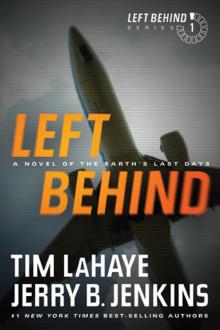 Left Behind: A Novel of the Earth's Last Days
Left Behind: A Novel of the Earth's Last Days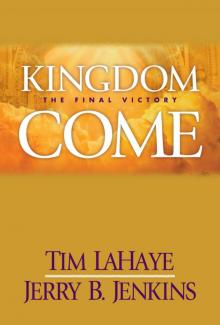 Kingdom Come: The Final Victory
Kingdom Come: The Final Victory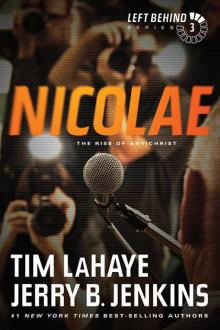 Nicolae: The Rise of Antichrist
Nicolae: The Rise of Antichrist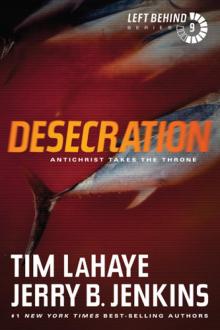 Desecration: Antichrist Takes the Throne
Desecration: Antichrist Takes the Throne Mark's Story: The Gospel According to Peter
Mark's Story: The Gospel According to Peter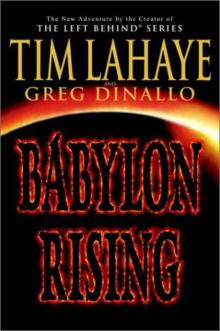 Babylon Rising
Babylon Rising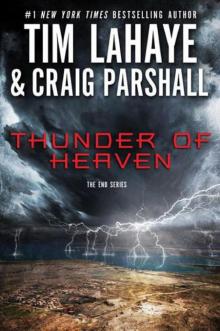 Thunder of Heaven: A Joshua Jordan Novel
Thunder of Heaven: A Joshua Jordan Novel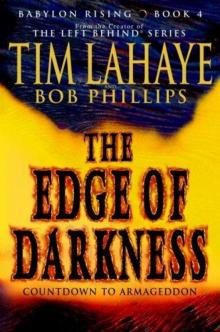 The Edge of Darkness
The Edge of Darkness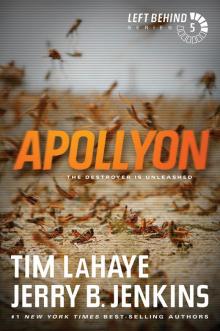 Apollyon: The Destroyer Is Unleashed
Apollyon: The Destroyer Is Unleashed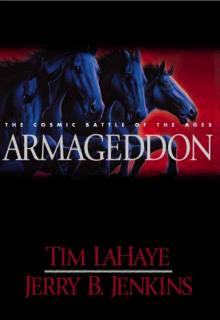 Armageddon: The Cosmic Battle of the Ages
Armageddon: The Cosmic Battle of the Ages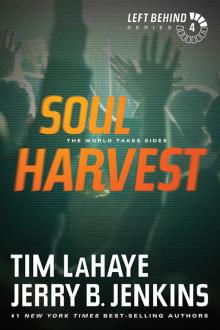 Soul Harvest: The World Takes Sides
Soul Harvest: The World Takes Sides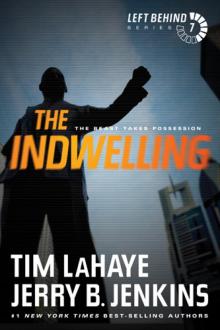 The Indwelling: The Beast Takes Possession
The Indwelling: The Beast Takes Possession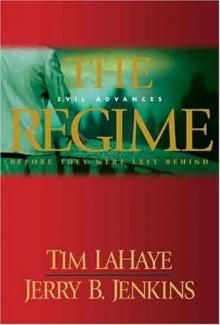 The Regime: Evil Advances
The Regime: Evil Advances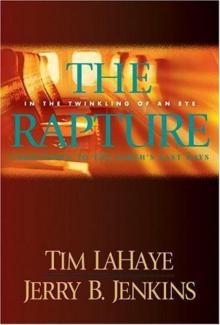 The Rapture: In the Twinkling of an Eye / Countdown to the Earth's Last Days
The Rapture: In the Twinkling of an Eye / Countdown to the Earth's Last Days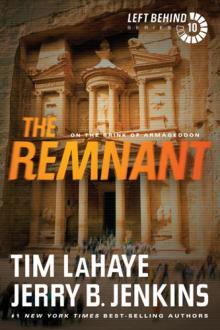 The Remnant: On the Brink of Armageddon
The Remnant: On the Brink of Armageddon John's Story: The Last Eyewitness
John's Story: The Last Eyewitness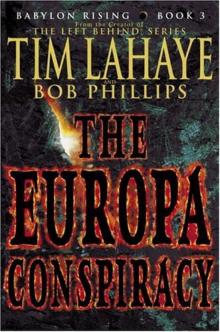 The Europa Conspiracy
The Europa Conspiracy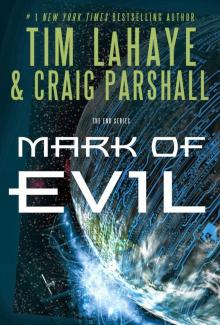 Mark of Evil
Mark of Evil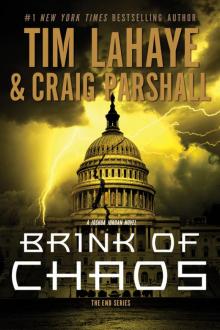 Brink of Chaos
Brink of Chaos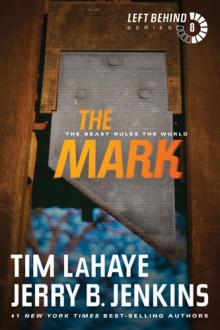 The Mark: The Beast Rules the World
The Mark: The Beast Rules the World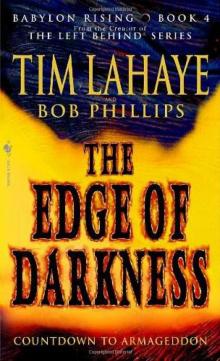 04 The Edge of Darkness
04 The Edge of Darkness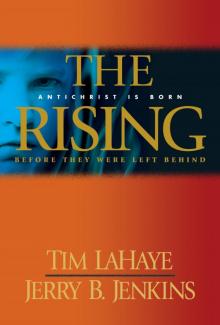 The Rising: Antichrist is Born / Before They Were Left Behind
The Rising: Antichrist is Born / Before They Were Left Behind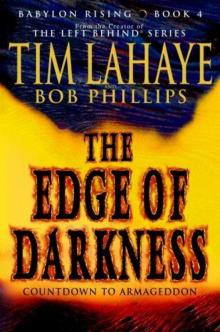 Babylon Rising: The Edge of Darkness
Babylon Rising: The Edge of Darkness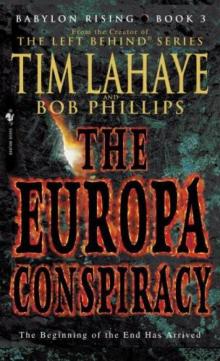 03 The Europa Conspiracy
03 The Europa Conspiracy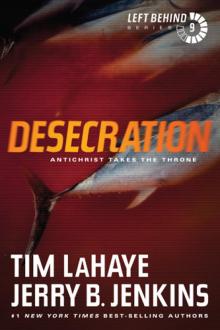 Desecration
Desecration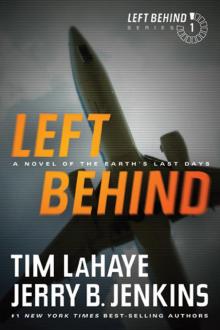 Left Behind
Left Behind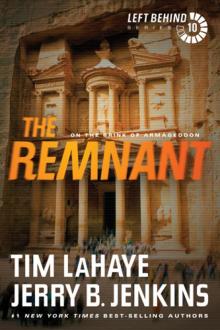 The Remnant
The Remnant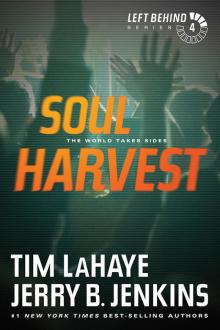 Soul Harvest
Soul Harvest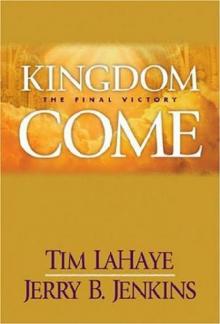 Left Behind Book 13: Kingdom Come The Final Victory
Left Behind Book 13: Kingdom Come The Final Victory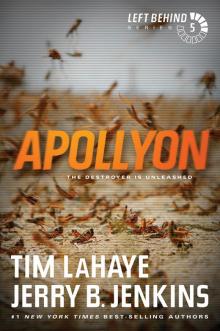 Apollyon
Apollyon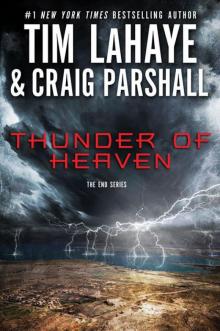 02 Thunder of Heaven: A Joshua Jordan Novel
02 Thunder of Heaven: A Joshua Jordan Novel Glorious Appearing
Glorious Appearing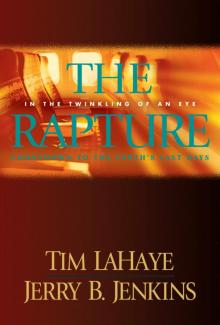 The Rapture: Evil Advances / Before They Were Left Behind
The Rapture: Evil Advances / Before They Were Left Behind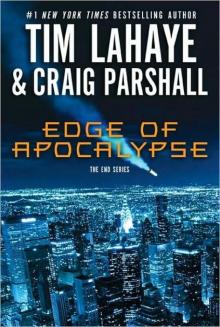 Edge of Apocalypse
Edge of Apocalypse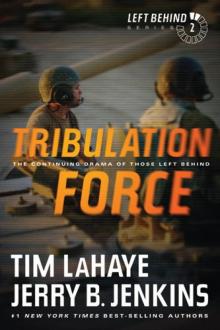 Tribulation Force
Tribulation Force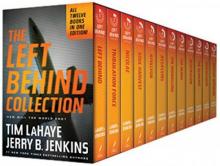 The Left Behind Collection: All 12 Books
The Left Behind Collection: All 12 Books Black Friday
Black Friday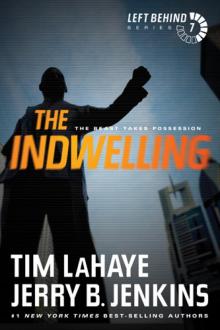 The Indwelling
The Indwelling The Left Behind Collection
The Left Behind Collection